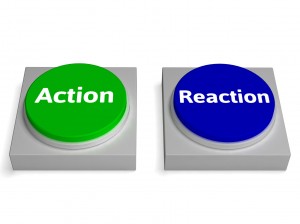Action Vs Reaction In Practice
Action Vs Reaction In Practice
– By Dr Nav Ropra.
 Have you ever said something and regretted it afterwards?
Have you ever said something and regretted it afterwards?
Did you do anything just for the sake of doing it?
Has anyone ever pressed your emotional buttons ?
There are times in people’s lives when they get praised and they feel puffed up. When you have done something for a patient or staff member and you get words of praise, it can make you feel on top of the world, bigger than ‘Alexander The Great’. Conversely, when someone challenges you and you get angry, great rage can come out of you and you may want to jump on that person – this is not action. These are both reactions. The other person is the manipulator and you are the manipulated. The other person has pressed a button in you and you are reacting like a machine. Just like switching a light on or off.
If someone says something to you, then you become the receiver in whatever they say. Then you react to what ever they say. This can occupy a lot of space in your thoughts and take up a lot of thinking time.
‘The other person has pressed a button in you and you are reacting like a machine.’
There is another way. If you remain detached and simply cool, then what can the other person do about it? If someone is throwing words of fire at you, your coolness will melt away any heat they have. Similarly, if they are praising you, you can thank them for their words, but don’t attach to them and don’t feel inflated by them. Remember, neither attach to reprimand nor praise in pursuit of your purpose in practice. For this to happen, you will need a centre, a healthy place from which to function from.
Some call it watchfulness and attune it with meditation. This is wise in practice and has its place, but a practice which is inactive will not grow and will remain stagnant. What I suggest is the completeness of watchfulness which is acting with spontaneity. When you act great intelligence arises in you and you become more present with what is going on. Present to the moment and those particular circumstances. You act from that place, and not emotionally react from the past. The person who is aware and has understanding acts. The person who is unaware, remains unconscious and reacts.
‘Remember, neither attach to reprimand nor praise in pursuit of your purpose in practice.
The practitioner who is able to act and not react is more responsible and has great ‘response-ability’ – that is the ability to respond. The responsible practitioner is always fresh, new, full of life and inspirational.
How does this relate to everyday practice life you may ask. In those moments when you are not doing anything, in-between patients, learn to become still again and re-connect with yourself. Take some time off in your surgery, close your eyes and relax your body and re-connect with your breath. You will need to replenish your connection with your consciousness to become sharp and focused with your work. Slowly and surely, you will learn the art of centeredness. As you bring your newly found center to the outside world, your dealings with people will become more clear with certainty, and your dental procedures will have greater precision and accuracy.
‘The practitioner who is able to act and not react is more responsible and has great ‘response-ability’ – that is the ability to respond.’
It is only by having the ability to centre yourself on a daily basis, gather your thoughts and deal with each and every situation with action that you are able to have a fulfilling practice. Then nothing will bother you in practice and your practice will start to grow as your centeredness begin to grow. Then you begin to move your dentistry from Dental Practice to Dental Mastery.
